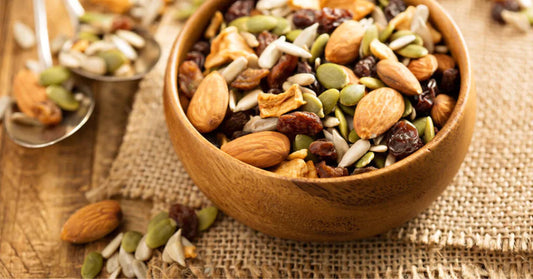Which Dry Fruits Are Most Effective for Improving Brain Health and Boosting Memory?
Summary: Walnuts, almonds, and cashews are among the most effective dry fruits for improving brain health and boosting memory.
Certain dry fruits stand out for their remarkable benefits to brain health and memory enhancement. The most effective ones include:
-
Walnuts: Rich in omega-3 fatty acids, antioxidants, and vitamins, walnuts are known to support brain function and protect against cognitive decline.
-
Almonds: High in vitamin E, magnesium, and healthy fats, almonds help improve memory and cognitive performance.
-
Cashews: Containing zinc, iron, and healthy fats, cashews contribute to better brain function and mental clarity.
-
Pistachios: Packed with antioxidants and healthy fats, pistachios promote brain health and reduce oxidative stress.
- Hazelnuts: Rich in vitamin E, folate, and healthy fats, hazelnuts support cognitive functions and protect brain cells.

How Do Specific Nutrients in Dry Fruits Enhance Cognitive Function?
Summary: Nutrients like omega-3 fatty acids, vitamin E, and antioxidants in dry fruits enhance cognitive function by protecting brain cells and improving communication between neurons.
The specific nutrients found in dry fruits play a crucial role in enhancing cognitive function:
-
Omega-3 Fatty Acids: Found in walnuts, these essential fats support brain health by reducing inflammation and promoting the growth of new neurons.
-
Vitamin E: Present in almonds and hazelnuts, vitamin E acts as an antioxidant, protecting brain cells from damage and slowing cognitive decline.
-
Antioxidants: Antioxidants in pistachios and cashews combat oxidative stress, which can damage brain cells and impair cognitive functions.
-
Magnesium: Found in almonds and cashews, magnesium helps improve brain plasticity, essential for learning and memory.
- Zinc: Cashews are rich in zinc, which supports brain signaling and communication between neurons.
Are There Any Scientific Studies That Support the Benefits of Dry Fruits for Brain Health?
Summary: Numerous scientific studies support the cognitive benefits of dry fruits, highlighting their positive effects on memory, focus, and overall brain health.
Scientific research has extensively studied the cognitive benefits of dry fruits:
- A study published in the Journal of Nutrition found that regular consumption of nuts, including walnuts and almonds, was associated with improved cognitive function in older adults.
- Research from the American Journal of Clinical Nutrition highlighted that participants who consumed nuts regularly showed better memory performance and cognitive scores compared to non-consumers.
- A clinical trial published in the European Journal of Nutrition demonstrated that consuming a diet rich in nuts, including pistachios and hazelnuts, led to improved brain function and reduced oxidative stress.
- A study conducted by the University of South Australia found that nut consumption, particularly walnuts, was linked to better mental processing speed and memory recall.
- Research in the Journal of Alzheimer's Disease suggested that vitamin E in almonds and hazelnuts helps protect against age-related cognitive decline and neurodegenerative diseases.

How Should I Incorporate Dry Fruits into My Daily Diet to See the Best Results for Brain Health?
Summary: To maximize brain health benefits, incorporate a variety of dry fruits into your daily diet by adding them to meals, snacks, and smoothies.
Incorporating dry fruits into your daily diet can be both easy and delicious. Here are some practical tips:
-
Breakfast Boost: Add chopped almonds or walnuts to your morning oatmeal or yogurt for a nutritious start to your day.
-
Snack Smart: Keep a mix of dry fruits like cashews, pistachios, and hazelnuts as a convenient and healthy snack option throughout the day.
-
Salad Topper: Sprinkle crushed nuts on top of salads to enhance flavor and add a crunch while boosting brain health.
-
Smoothie Add-in: Blend dry fruits into your smoothies for an extra dose of nutrients without compromising on taste.
-
Energy Bars: Make homemade energy bars using a mix of nuts, seeds, and dried fruits for a brain-boosting treat on the go.
-
Baking: Incorporate nuts into your baking recipes, such as adding chopped almonds to muffins, breads, and cookies for an added nutritional punch.
-
Trail Mix: Create a custom trail mix with your favorite nuts, seeds, and dried fruits for a portable and nutritious snack.
- Nut Butters: Use almond or cashew butter as a spread on toast, in sandwiches, or as a dip for fruits and vegetables.

Are There Any Potential Side Effects or Precautions to Consider When Consuming Dry Fruits for Brain Health?
Summary: While generally safe, consuming dry fruits in moderation is important to avoid potential side effects such as digestive issues or allergic reactions.
Although dry fruits are packed with health benefits, it is essential to consume them in moderation and be aware of potential side effects:
-
Digestive Issues: Overconsumption of dry fruits can lead to digestive problems such as bloating, gas, and constipation due to their high fiber content.
-
Allergic Reactions: Some individuals may have nut allergies, which can cause symptoms like itching, swelling, or difficulty breathing. Always check for allergies before consuming new types of nuts.
-
Caloric Intake: Dry fruits are calorie-dense, so portion control is important to avoid excessive calorie intake, which can lead to weight gain.
-
Oxalates: Nuts like almonds contain oxalates, which can contribute to kidney stone formation in susceptible individuals. Stay hydrated and consult a healthcare professional if you have a history of kidney stones.
- Sodium Content: Some commercially available dry fruits may be salted or contain added sugar. Opt for unsalted and unsweetened varieties to maximize health benefits.
Conclusion
Dry fruits offer a natural and delicious way to boost brain health, enhance memory, and improve focus. Rich in essential nutrients like omega-3 fatty acids, vitamin E, and antioxidants, dry fruits provide substantial cognitive benefits supported by scientific research. Incorporating a variety of dry fruits into your daily diet can promote overall brain health, but it's important to consume them in moderation and be mindful of potential side effects. Embrace the power of dry fruits for a healthier, more focused mind, naturally.














